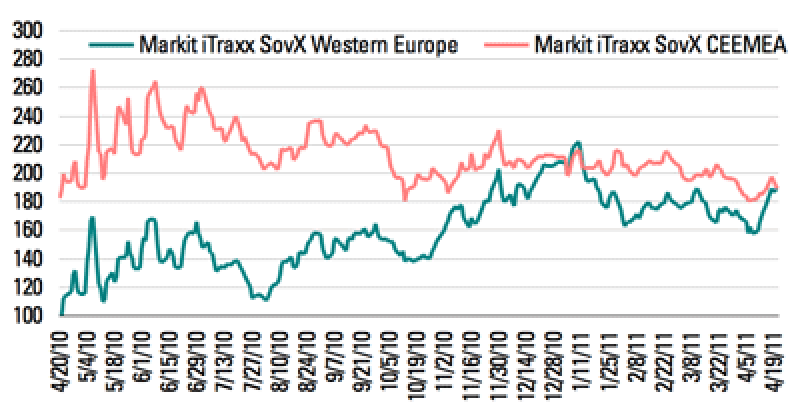European sovereign credits entered yet another fragile stage last week after rumours of a Greek debt restructuring circulated around the market. Greece’s five-year spreads ended the week at over 1,100bp, a new record, with investors fearful of the inaugural eurozone default. The speculation didn’t abate following weekend reports in Greek newspapers that said the government had discussed a debt restructuring with the “troika”: the European Commission, the European Central Bank and the International Monetary Fund.
Specifically, a maturity extension was discussed, a measure that U.S. Treasury Secretary Tim Geithner is in favour of, according to reports. Denials from the Greek government and the Bank of Greece governor were largely ignored by the market, and by Thursday Greece’s spreads were over 1,300bp and its one-year bond yields were in excess of 20%.
The other peripheral eurozone credits felt the impact of the Greece-inspired negative sentiment. Ireland was one of the worst performing names, widening by 100bp over the week to 645bp. Portugal’s spreads were even wider at 650bp, surpassing last week’s record. In addition to the Greek restructuring talk, Portugal had to contend with unfavourable events in Finland.
The general election on Sunday produced the outcome that many feared – large gains for the anti-bailout True Finns party. It still seems likely that the pro-E.U. parties can get enough votes to approve the bailout, but the success of the True Finns introduces another uncertainty that has to be priced in by the markets. The weak performance of the peripherals led to the Markit iTraxx SovX Western Europe index widening, and it has now converged on the Markit iTraxx SovX CEEMEA for the first time since January this year.

There is no doubting the significant impact of the eurozone’s sovereign debt crisis on the broader market. But the most eye-catching event of the week was S&P’s decision on Monday to place the U.S. sovereign’s AAA rating on negative outlook. The agency cited the country’s “very large budget deficit and rising government indebtedness” and the “reasonable chance that it would still take a number of years before the government reaches a fiscal position that stabilises its debt burden”.
The dire state of the U.S. government finances is hardly a secret, so S&P’s move should have been priced in. But the agency crystallised the current impasse in US politics, and it is the concern that political deadlock will prevent the necessary medium- and long-term fiscal measures from being implemented that shook the markets. The US sovereign was the fourth-most active CDS name last week, so it will be interesting to see the figures for this week when they are published by the Depository Trust & Clearing Corporation.






